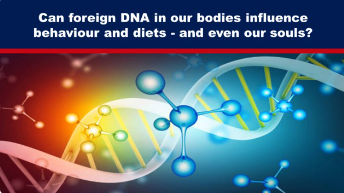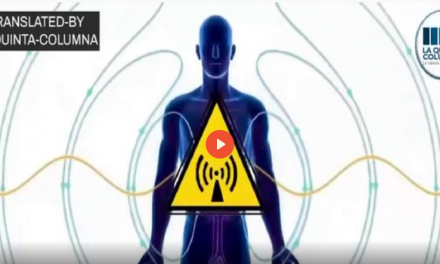Recipients of organ transplants report inheriting their donor’s traits such as behaviours and diets. Some scientists argue that this is due to physiological and psychological imprinting. However, the hypothesis of microchimerism appears to be more compelling.
Microchimerism is the presence of cells (or DNA) from one person in another genetically distinct person. It can occur naturally, for example, during pregnancy, when foetal cells transfer to the mother’s bloodstream and vice versa. And it can occur artificially from organ/tissue transplantation or blood transfusion, where donor cells can persist in the recipient’s body for years.
According to Dr. Mathew Maavak, the experimental gene therapy injections known as “vaccines” allegedly cause microchimerism.
Because organ transplant recipients report inheriting traits from donors, possibly through microchimerism, Dr. Maavik asks the question: Can foreign DNA control your soul?
Can foreign DNA control your soul? — Part 1
Can Biotechnology Control Human Behaviour? That was the title of a thought-provoking article penned by Guy Hatchard for the Brownstone Institute recently. The article was partly based on a paper published by the journal Transplantology which documented “the experiences of individuals who received a range of donated organs including hearts, kidneys, liver, and lungs.” According to the Hatchard:
In all, 87% of subjects experienced marked unusual changes that challenged their behaviour, sense of identity, and personal preferences. First-person reports and evidence from donor families confirm that some of these effects involve the transfer of personality traits such as food or behavioural preferences from the donor to the organ recipient. For example, an avid meat eater might become a vegetarian who cannot face meat on their plate.
This is an unexpected result that challenges conventional ideas. This study points to the distributed location of memory throughout physiology and its close association with a variety of organ systems. It amply illustrates how little the life sciences understand about the interface between consciousness and matter. [Emphasis added]
But has this phenomenon been conclusively established, at least in terms of correlation? The Transplantology paper conducted a cross-sectional study among 47 participants (23 heart and 24 other organ recipients) which is an admittedly small sample but its observations have been echoed by other studies.
Repository of the soul?
Dr James Kneller, a cardiac electrophysiologist, has described how an organ, particularly the heart, within the transplant recipient, may borrow “certain personality traits, preferences, and even character features from the donor. It is as though the transplanted heart contains the mind and soul of the donor which then finds expression in the recipient…So, while heart transplant is extending the life of the recipient, it is also giving new life to the donor.”(Emphasis added)
Kneller’s succinct YouTube presentation included several startling examples. He described how the heart from a dead cyclist had triggered a new passion for the pastime in a recipient; how a dead stuntman’s heart likewise sparked a new athletic fad in an executive who had no prior interest in sports, along with an uncanny predisposition towards a particular singer whom the deceased donor had once adored. In a similar fashion, a 47-year-old woman, who received the heart of a teenage boy killed in a motorcycle accident, soon developed a craving for beer, green peppers, Snickers bars and KFC after her transplant. She began to feel more aggressive, assertive, tougher and fitter. Even her walk became more manly and she eventually lost the desire to have a boyfriend.
While most examples cited thus far could be described as “fascinating,” others were outright disquieting. In one particular case, the dead donor began to appear in the dreams of the recipient and promised “never to be separated” from her. Kneller recounted how the heart of a suicide victim led the recipient to gravitate towards, and later marry, the widow of the donor. The recipient ultimately committed suicide in a manner that was identical to the donor.
In yet another case, an eight-year-old girl who received the heart of a 10-year-old female murder victim began to experience dramatic post-operative nightmares about the donor’s murder which, upon further investigation by a psychiatrist, led to the identification and arrest of the murderer.
Kneller cautioned against underestimating the hidden dynamics of the heart. He noted how recipients of artificial hearts – one where the heart is replaced by a mechanical contraption – may completely lose their sense of “emotion, warmth and empathy.”
Apart from the human heart, a transplanted liver may cause a similar behavioural effect. Rather curiously, the Malay word for the figurative heart or soul is “hati”but literally, it refers to the liver. Was this knowledge of distributed physiological memory known to the ancients?
Alongside a biblical explanation, Kneller proffered a scientific theory for this phenomenon. Both the brain and heart are “electrical organs” which operate in symbiosis with each other. The “electrical density of the heart is reportedly 5,000 times stronger than the brain” and it generates an electromagnetic aura that extends to 10 metres in radius around the person.
Imagine what happens when the electromagnetic auras of people overlap. Crowded social settings can affect people in more ways than one – even when active interactions i.e. conversations are absent. Close physical contact between people, such as the holding of hands, can also synchronise heartbeats. In such instances, a person’s brain wave (measured via EEG) may begin to mirror another’s heartbeat (measured via ECG). The level of resonance should be stronger when intense physical intimacy is involved. Heartbeat synchronisation can also occur between a much-loved pet and its owner.
The interactions between the heart, cerebral spinal fluid and the brain is a complex one as each continuously attempts to influence the whole. This is a medical necessity as biological systems need to continuously adapt to deal with new physiological and psychological circumstances i.e. exercise, intimacy, work, sudden injuries or the introduction of particular foods, toxins or microbes. These adjustments are performed 24/7/365. As I have written many times before, the human body is the ultimate complex adaptive system (“CAS”) – one which is nearly impossible to deconstruct through Cartesian means.
There is a famous saying that “you are what you eat” but I have also lived by the dictum that “you are who you mingle with.” Ever been with people who appear nice or considerate on the surface but whose presence ignites certain negative reflexes, memories or trains of thought? Ever attended church services that had constantly induced a sense of uneasiness or even anxiety? Can this be explained away by human electromagnetic auras? Or is there something deeper at work here, involving physiological, mnemonic (memory) and spiritual elements?
Here is a personal example. A few years back, I was invited to attend my primary school reunion dinner. I had lost touch with my old classmates and could not remember most of them. But I was hit with a sudden blast of nostalgia upon receiving the invitation. Apart from recalling old sights, smells and innocent experiences, Boney M songs began to pervade my mind as they were hugely popular during my childhood.
Upon meeting these people, however, the sweet sense of nostalgia was instantly replaced by a crude blast from the past. Everyone was nice to me. Yet my mind (and perhaps my body too) could visibly discern the ubiquitous one-upmanship of yore. Certain reflexes which were long dormant began to resurface. I began to feel sick, beginning with my gut.
My experience was akin to a dog returning to its vomit as the Bible puts it (Proverbs 26:11). The human mind and body routinely sift memories in order to optimise the potentials of the person. Nostalgia can be a deceptive pit for the unwary.
So, what caused me to view the past through a rose-tinted lens, at least in the days leading up to the reunion and a short period thereafter? Maybe, it had to do with Boney M whose tunes once ruled the airways and which defined the zeitgeist of my childhood? Maybe it had to do with the common notion of the “good old days” when “life was simpler”? Were these collective experiences imprinted into my mind and body? Or maybe, I had forgotten that Boney M album covers were once gratuitously sickening, in stark contrast to their songs?
When bonds are forged in the cauldrons of contradictions, character deficiency and malice, false memories may be a primary outcome. A person’s collective experience and character can literally be deposited in the heart. As the Bible puts it: “The heart is deceitful above all things, and desperately wicked: who can know it?” (Jeremiah 17:9).
Your social circles should have the right auras. Redress them before it is too late.
Microchimerism
A transplanted heart can create new hobbies, predilections and even a newfound desire to kill. The phenomenon where organ recipients inherit donor traits is a fascinating and controversial area of study. Some scientists argue that transplantation may cause physiological and psychological imprinting. As a result, several terms have been coined to describe this arcane phenomenon, including:
1. Cellular Memory: According to this hypothesis, cells within an organ may retain “memories” or characteristics of the donor, which can be transferred to the recipient. Although cellular memory is not widely accepted in the scientific community due to a lack of empirical evidence, it is a term often used in discussions about post-transplant changes in recipients.
2. Donor-Derived Traits: This is a more general term referring to any characteristics or behaviours that appear in the recipient post-transplant and seem to be attributable to the donor. These traits can range from changes in preferences and habits to alterations in personality.
3. Transplant Acquired Characteristics: Similar to donor-derived traits, this term refers to new characteristics or changes that a recipient acquires after receiving a transplant, potentially linked to the donor’s traits.
4. Psychosocial Changes: This term is used more broadly to describe changes in a recipient’s psychological state or social behaviours following an organ transplant. These changes can be influenced by the stress and emotional impacts accompanying a major medical procedure.
All the conditions described above appear to be nuanced terminologies which describe the same underlying phenomenon. They are part of what some researchers call the “systemic memory hypothesis” which suggests that cells, tissues, or entire organisms in biological systems have a form of “memory” that influences their responses to environmental stimuli or stressors based on past experiences. (Systemic memory can be applied to environmental and computational systems as well).
There is however one other hypothesis that explains post-transplant trait changes in a more expansive manner.
5. Microchimerism: This refers to the presence of a small number of cells in an individual that originates from a genetically different individual. This condition, which can occur after organ transplantation, might provide a biological basis for the transfer of some donor traits.
The microchimerism hypothesis appears to be the most compelling one in the context of donor trait transfer. The common denominator across all human organs is the DNA which is unique to the person. Perhaps this is where particular traits are subtly encoded? Perhaps the DNA is the “repository of the soul” or at least an extension thereof? If so, it can also be the ultimate gateway for the manipulation of the soul.
It is important for the layman to differentiate between “genetic imprinting” and “microchimerism.” Both occur naturally but the distinction between the two has now been somewhat blurred by advancements in biotechnology, particularly the CRISPR-Cas9 method. Think of experimental gene therapies aka “vaccines” for starters! It allegedly causes both genetic imprinting and microchimerism.
Natural genetic imprinting involves the silencing of certain genes inherited from either parent. Such imprinting is crucial to the suppression of defective genes upon conception. Natural microchimerism, on the other hand, involves the presence of a small number of cells in a person that originate from another genetically distinct person. This can occur naturally, such as during pregnancy when cells from the foetus migrate into the mother’s body and vice versa. Foetal cells can persist in the mother’s body for decades after pregnancy and microchimerism has been implicated in various autoimmune diseases and other conditions. It can also occur during organ transplantation and blood transfusion.
But what about artificial gene imprinting and microchimerism? I have touched on some of the dangers associated with gene-edited chimerism in the following article. It reads like a depressing Jurassic Park script.
Read more: Coronavirus in a Time of Chimeras and Beyond, Dr. Mathew Maavak, 19 March 2024
Now, if the organ of a human donor can induce changes – for the better or worse – in a recipient, imagine what could happen when you have a heart transplanted from a genetically modified pig. Two such recipients did not survive beyond 60 days but that is not deterring medical researchers from “perfecting” the cutting-edge technique.
After watching the clip above, I was reminded of the biblical account of the man possessed by legions of demons in Mark 5:1-13. Was that account included in the Bible to warn us of peculiar End Times dangers?
Finally, I strongly recommend a specific prayer – expressed according to the wisdom of the believer – before or after one receives a new human organ or blood transfusion. I would also be obliged if the reader can enlighten me on what else the Bible says on this subject matter.
We shall explore this topic further in Part 2.
Source: https://expose-news.com/2024/06/12/can-foreign-dna-in-our-bodies-influence/
Bitchute: https://www.bitchute.com/channel/YBM3rvf5ydDM/
Telegram: https://t.me/Hopegirl587
EMF Protection Products: www.ftwproject.com
QEG Clean Energy Academy: www.cleanenergyacademy.com
Forbidden Tech Book: www.forbiddentech.website













